Gone for Good: The Science Behind our Signature, Sustainable Fabric - BioKnit


To us, the perfect bag: helps clean up plastic pollution that is already here, keeps additional plastics from entering the environment, and doesn’t end up as pollution itself at the end of its lifespan. Ideally, it also combines function and style, so that people actually use it instead of the easy alternative.
Doesn’t exist. We think we’ve finally done it.
Biodegradable fabric has been a goal of ours since day one, so when a brand-new textile technology arrived, we were ON it. Junes made from our new BioKnit™ fabric are among the first products to be made with a new additive called CiCLO® which allows synthetic fibers to be broken down like natural fibers in the environment. This includes both the fabric itself that may end up in a landfill and shed microplastics that may end up in the oceans. Since the world of “green products” can be very confusing and misleading, we wanted to break down exactly how BioKnit was created, works, and behaves if it were to find itself in the environment.

Let’s start at the top: cleaning up what’s already here. And what’s already here is a lot. An estimated 8.3 billion tons of plastic has been produced since the 1950s, only 9% of which has been recycled, and 79% of which has ended up in landfills or the environment. Over 8 million tons of plastic enters our oceans every year. To that end, it has always been our goal to source recycled plastic thread for our fabric and now use this as the base for BioKnit™. The synthetic fibers come from plastic bottles that would otherwise end up in landfills and waterways and create a super strong and durable bag made to use for many years to come. This keeps additional plastics from entering the environment by way of single-use bags, which takes care of number two.
As for that third ask – the lifespan that ends by returning to the earth – that’s where the real magic happens. Currently, 35% of microplastics entering the ocean come via synthetic materials and 44 million lbs. of synthetic textiles arrive to U.S. landfills each day. To compound the problem, mass textile recycling doesn’t yet exist. While we have dedicated our business to eliminating plastic bag usage, it felt disingenuous not to consider the impact of our own bags as well. We developed our own recycling program, but can never guarantee that every bag we sell stays in the cycle. We manufacture quality products to be used for life, but life includes washing, and washing leads to microplastic shedding. The only solution to closing the loop for Junes and plugging all the leaks was to create a new kind of fabric – a biodegradable synthetic.
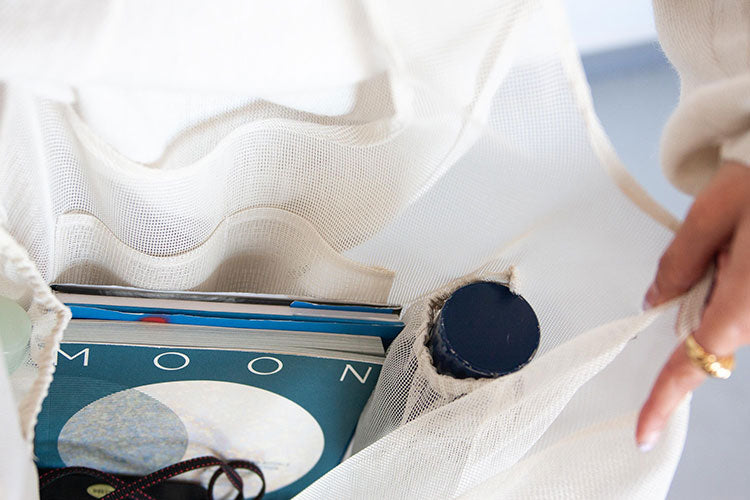
Enter CiCLO®. Literally translating to “cycle” – CiCLO® is a brand-new technology that allows us to finally close the loop on the lifecycle of our own products and can help close the loop on plastic pollution in the textile industry as a whole. Combined with plastic fibers in the meltdown process, it becomes permanently embedded and never washes away. The additive allows synthetic materials to be broken down and consumed like natural fibers in the environment via naturally occurring microbes. No new plastics is part of our mission at Junes, so we combine CiCLO® with recycled plastic fibers to create BioKnit™. The result is a fabric that leaves the Earth when its usefulness is done, taking plastic that would otherwise last virtually forever along with it - a net positive plastic reduction for the planet.
So… wouldn’t bags made from BioKnit™ just eventually fall apart with repeated use and wash? Nope! Think of it this way: does your favorite wool sweater do that? Maybe it softens a bit and begins to show its wear, sure, but it doesn’t just disintegrate. However, in a landfill it would eventually be consumed as would wool microfibers that found their way into our waterways. The best way to describe BioKnit™ is that it behaves like a synthetic while it’s here, but like natural fibers with long term exposure to the environment. Third party studies show that CiCLO® fibers biodegrade at rates similar to wool in sea water, wastewater treatment plants, and landfill conditions.
There it is again. The “B” word. You may be wondering why we don’t market BioKnit™ as biodegradable. After all, that’s what it is, right?
Well, yes… but here’s the thing: there are certain legal restrictions on using the word “biodegradable” or any of its synonyms or derivatives. The reason being that if people see something labeled as such, they may be encouraged to use it and toss it, assuming it will quickly return to the earth. The reality is that actual biodegradation takes time and the best option for all plastics and textiles, including Junes bags, is the old adage: reduce, reuse, recycle. And we wholeheartedly agree! Until there is greater prevalence of and knowledge surrounding biodegradable products, we must first do everything we can to get the plastics that are already here out of the environment.
Marketing aside, according to the FTC, a claim that a plastic item is biodegradable is permitted as long as the time and extent of degradation is backed by solid scientific evidence and clearly stated. To that extent, Junes BioKnit™ meet the standards to be considered biodegradable, as measured by internationally recognized testing established by the American Society for Testing and Materials (ASTM). Long term studies prove greatly accelerated rates of biodegradation for CiCLO® materials, while untreated textiles remain persistent. We’re sharing that information here, though we must note that lab conditions are ideal and the actual rate and extent of biodegradation can vary greatly in natural environments.
As always, we’re committed to sustainable manufacturing of our products and components, and we’re proud to say that CiCLO® is held to the same standard. The chemistry used to make CiCLO® fibers is ECO PASSPORT by OEKO-TEX® certified, which is to say that each individual element is evaluated and meets criteria for being deemed not harmful to human health and ecologically responsible textile manufacture.
One last note – If you’ve noticed that some of our OG Junes bags and colors are being phased out, we hope this article has given you a good idea why. Yep. Our goal is for all Junes bags to be made exclusively from BioKnit™ fabric. We believe this technology to be the future in responsible textile production and are stoked to be leading the way in closing the loop on plastic pollution in our industry once and for all.
If you’d like to learn more about CiCLO®, check out their website for even more technical information and links to other applications of this amazing advancement in ecological science.
Please continue to love your non-BioKnit™ Junes bags for as long as possible, and don’t forget to send them back to us for recycling when you’re done. They’ll eventually become BioKnit™ too.




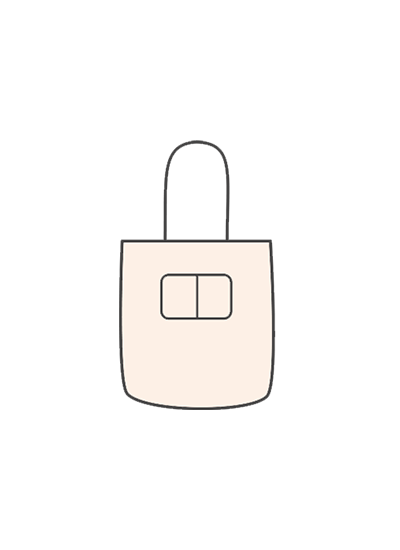



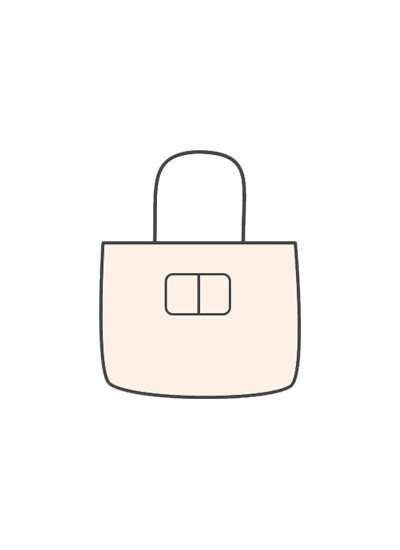

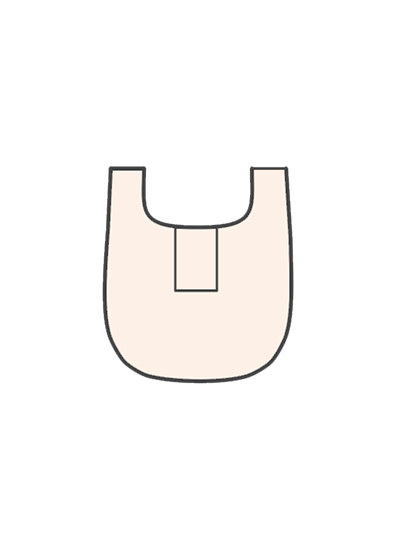

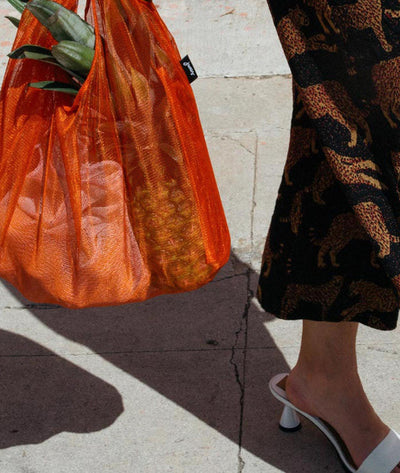



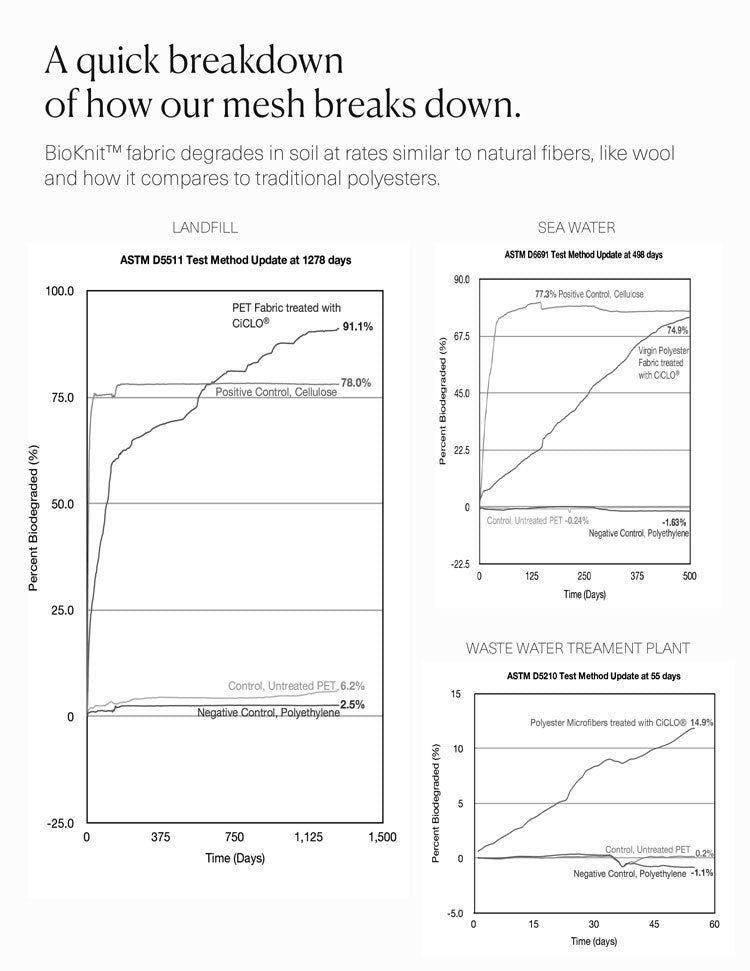
Leave a comment